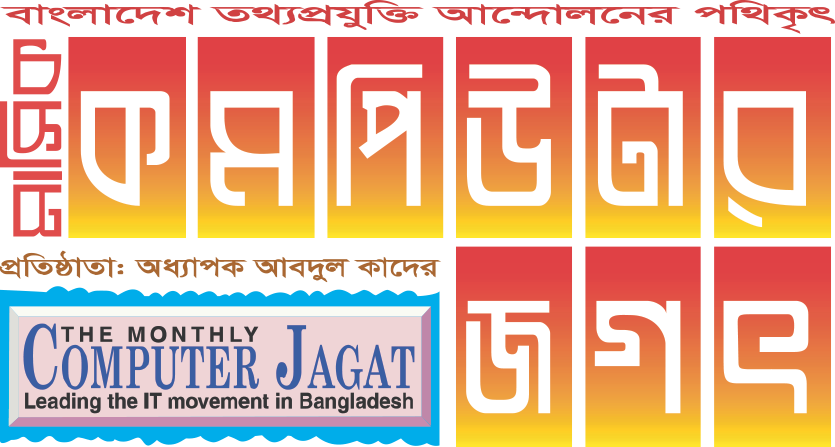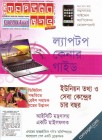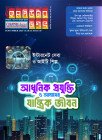হোম > Mainstreaming ICT for Digital Bangladesh
লেখক পরিচিতি
লেখকের নাম:
আহমেদ হাফিজ খান
মোট লেখা:১৫
লেখা সম্পর্কিত
পাবলিশ:
২০১০ - আগস্ট
তথ্যসূত্র:
কমপিউটার জগৎ
লেখার ধরণ:
ডিজিটাল বাংলাদেশ
তথ্যসূত্র:
ইংরেজি সেকশন
ভাষা:
বাংলা
স্বত্ত্ব:
কমপিউটার জগৎ
Mainstreaming ICT for Digital Bangladesh
Government wants to achieve Digital Bangladesh through empowerment of the people and improving the lifestyles of the people. The whole vision has now been enslaved by the bureaucrats sidelining the professionals and academicians. The bureaucrats with the vision of minting money and misleading the government are busy in creating superfluous projects and a hype of success.
The basic requirement for the Information Technology to flourish lies in the improvement of the quality of education starting from kindergarten to university, creating opportunities for research and development (R&D) in the university and the national R&D institutions. These pertinent issues continue to be neglected and it is extremely pathetic to see the posts of the ICT professionals occupied by the bureaucrats. The bureaucrats posted in the ministry and departments continue to exploit the government through their overseas tours on the pretext of trainings, seminars and meetings.

The small achievements in the country by enthusiasts and entrepreneurs are ignored to make way for the greed of the few. The talents who could have changed the fate of the country through their knowledge are ignored and never given chance. We quote the success of our neighbor but fail to understand the policy of nurturing local talents and industry. produce over 4000 ICT graduates but we deliberately ensure never to make them productive through setting up software finishing school. We speak about promoting call center industry in the country but deliberately ensure the cost of bandwidth and other inputs are high so this industry never succeeds. We speak of making our country a truly Digital Bangladesh but all our bureaucratic endeavors are geared against it, making sure to enslave ICT professionals in the tentacles of bureaucracy by creating a bureaucratic ICT directorate. When the world is moving towards empowering the professionals we are being enslaved by the old thoughts of bureaucracy.
Bangladesh as a nation has committed to achieve milestones under various international commitments such as WSIS, MDG, WHO, UNICEF etc. Unfortunately those treaties have remained grossly unachieved. Countries with lesser potential than Bangladesh have fared better than Bangladesh because the bureaucracy has been kept within their bounds by the political administration. In other words political vision dictates the bureaucracy in the successful model, whereas bureaucracy dictates the political vision in Bangladesh. To make the matter worse the UNDP has established a tentacle within the government hierarchy for policy twisting in the country. The Access to Information (A2I) project has now become a family business for the some and dictating untested alien ideas in the society and the government.
The government has already elapsed nearly one and half years of its time frame but unfortunately the achievement in the area is extremely slow. The Hitech Park, Software Technology Park, Human Resources Development Company under BCC is yet to be established. There is no concerted effort to improve the quality of education through ICT. The government must create a specialist team from academia and industry to lay the foundation of Digital Bangladesh though improving quality of education.
ICTs have some impact on intangible elements of remoteness. The development policy for Digital Bangladesh must provide access to some previously-excluded resources. It needs to address the systemic exclusions faced by communities outside the capital city Dhaka. A2I's prescription so far appear to be a technology of inequality; favoring those residents who begin with better resource endowments. On this basis, it is recommended that rural ICT projects need to be:
Info-centric: focusing less on the technology and more on the data that technology carries.
Chain-centric: attending to the additional information chain resources - over and above technology and data - that are required in order to turn digital data into development results.
Socio-centric: recognizing that new information chain resources are mainly provided by individuals' social contact networks.
Economy-centric: being especially mindful of ICT uses that enable new or more productive income-generating activities.
The current minister for science & ICT is hardworking. He is trustworthy and is gifted personality with love for art and culture. His philosophical guidance has led to the successful implementation of the complex projects utilizing 100 crore special allocation. The country eagerly urges the ICT minister for looking into the issues of the sustainability of these projects. The minister may kindly look into the matters of the officers within the ministry, where a group is jeopardizing his clean image through distributing foreign travels.
The government has infused enthusiasm in the younger generation through ensuring the implementations of its election commitments. The government needs to ensure realization of Vision 2021: Digital Bangladesh through mainstreaming of ICT professionals. The government must realize that professionals not bureaucrats can give solutions to the issues related to technical nature. This requires giving freedom to the technical organization not enslaving technical organization through converting to a directorate. The dark days of global economic recession are slowly lifting and economic activities are gaining pace in the developed economies. Bangladesh can take benefit by initiating ICT training for youths to take up jobs left vacant by the foreign knowledge during the recession.
The country experienced hiccups in the ICT sector development during the last fiscal year because of global economic downturn and the activities of few within the realm of the secretariat. Government will not realize benefits of information and communication technologies (ICTs) without improving the manner in which it engages with ICT professionals and bureaucrats. Implementation of the transformative agenda of Digital Bangladesh requires political leadership. However, since leadership of the ICTs and development agenda is too important to be left at the mercy of bureaucracy, they must be made accountable to and seek the involvement of civil, professional associations, academic and research institutions. ICT professionals and the Diaspora will rise to these challenges and provide suggestion to the government.
CJ WEB
লেখাটি পিডিএফ ফর্মেটে ডাউনলোড করুন
লেখাটির সহায়ক ভিডিও
পাঠকের মন্তব্য
২০১০ - আগস্ট সংখ্যার হাইলাইটস
অনুরূপ লেখা



